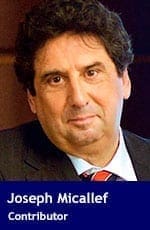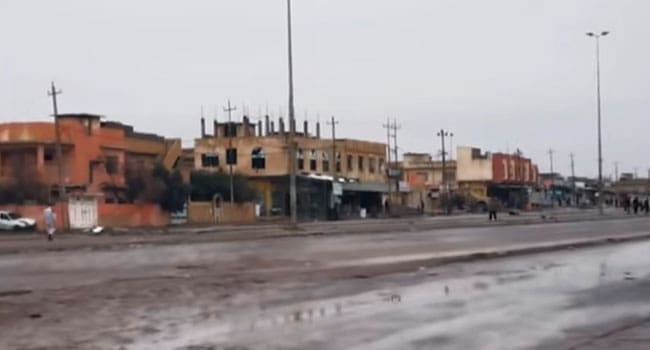 The battle for Mosul will end in tragedy for hundreds of thousands of the city’s inhabitants.
The battle for Mosul will end in tragedy for hundreds of thousands of the city’s inhabitants.
Iraqi Prime Minister Haider al-Abadi recently told the UN that the campaign to liberate Mosul would begin within weeks. He predicted victory by year’s end. U.S. Gen. Joseph Dunford, chairman of the Joint Chiefs of Staff, has confirmed an imminent campaign.
The outcome will inevitably be grim.
The campaign will be hard fought against a tenacious enemy, and be hampered by political divisions and sectarian conflicts. Even if successful, it will simply open a new chapter in the sectarian violence and political instability that plagues Iraq.
And the Iraqi government doesn’t have the billions needed to reconstruct Mosul in the aftermath.
It’s impossible to predict how effective Iraqi forces will be or how tenacious the Islamic State (IS) resistance. It’s also impossible to predict the date of Mosul’s liberation.
However, a number of factors suggest the campaign will drag out and Mosul likely won’t be liberated before next spring.
First, there is no central command. Four armies are descending on Mosul: the Iraqi army, the Hashd al-Shaabi Shiite militia, Sunni militias and the Kurdish Peshmerga Forces. All operate independently.
The U.S.-led coalition is providing air and artillery support, and training and logistical services. Their advisers are working with Iraqi troops. Coalition forces report to and are co-ordinated by the U.S. Central Command.
Turkey has sent a battalion-sized force into Bashiqa in northern Iraq, ostensibly to train Sunni militias. It’s unclear what other role Turkish forces might seek to play.
Iran has many officers and “volunteers” from the Revolutionary Guard within the Shiite militias. It also has about 5,000 troops along the border with Kurdistan. What role these forces might play is also unknown.
Co-ordinating such a disparate force, especially when so many of them are antagonistic to each other, will prove difficult. There have already been clashes between Shiite militias and Sunni and Peshmerga units.
Secondly, IS has had more than two years to prepare. Judging by its determined resistance in the Iraqi cities of Tikrit, Ramadi and Fallujah, IS can be expected to mount a tenacious, scorched-earth resistance that will see protracted urban fighting.
In Mosul, Islamic State has apparently taken additional steps to slow down the Iraqi advance. The city has been ringed with oil tanks ready to be set afire if Iraqi troops penetrate the city limits. When IS militants retreated from the Qayyarah air base, they set local oilfields afire.
Given the importance of smuggled oil for IS’s finances, their willingness to torch oilfields suggests they understands they are approaching the end game and that once dislodged, they are unlikely to regain control soon.
Equally troubling has been IS’s use of chemical weapons. IS is manufacturing mustard gas, a highly toxic First World War-era nerve gas. That was confirmed when Sleiman Daoud-al Afari, IS’s head of chemical weapons development, was captured. IS has also used chlorine gas.
Mustard gas is highly toxic and persistent. In an urban setting, it could be used to create area denial zones that slow down advancing troops or force them into prepared kill zones. It would also make post-liberation cleanup highly dangerous and result in significant civilian casualties.
The Pentagon says there are about 5,000 IS fighters in Mosul. Iraqi sources place the strength at around 30,000. The number is probably in the middle.
With a civilian population of up to two million people, and an opponent determined to die fighting, the liberation of Mosul is going to be the bloodiest, most bitterly-fought urban campaign since Stalingrad.
UN sources say that one million people could be displaced and that it will take months, if not longer, before the city is safe enough for them to return. Large areas will likely be rendered uninhabitable.
UN Refugee Agency officials believe neither they nor the Kurdish and Iraqi governments can handle this scale of refugees. Iraq’s proposal to bus 250,000 Mosul refugees to abandoned buildings in Tikrit was denounced by Sunni leaders as hopelessly inadequate and a thinly-veiled attempt at the ethnic cleansing of Sunnis from Mosul.
Despite Iraqi and U.S. assurances that Mosul will be liberated by the end of the year, such an outcome seems highly unlikely.
In the meantime, no one seems prepared to deal with the hundreds of thousands of refugees from this impending tragedy.
Joseph Micallef is a historian, best-selling author and, at times, sardonic commentator on world politics.
Joseph is a Troy Media contributor. Why aren’t you?
The views, opinions and positions expressed by columnists and contributors are the author’s alone. They do not inherently or expressly reflect the views, opinions and/or positions of our publication.


